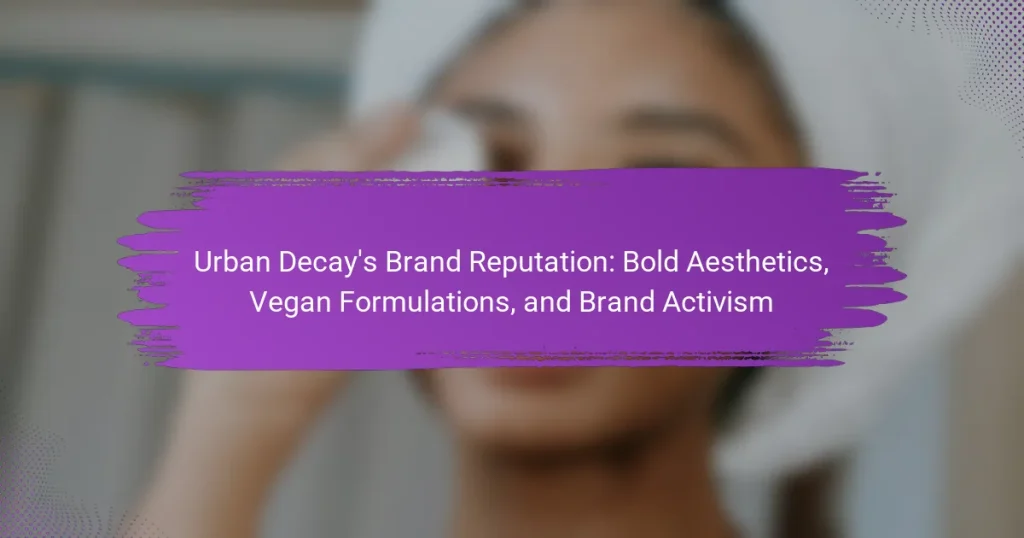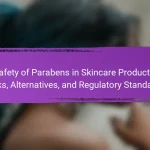Urban Decay is a cosmetics brand recognized for its bold aesthetics, vibrant colors, and commitment to cruelty-free and vegan formulations. The brand emphasizes ethical sourcing and sustainability while actively engaging in social issues, promoting inclusivity and empowerment. Urban Decay’s reputation is built on its innovative product offerings and brand activism, which resonate with socially conscious consumers. This strong brand identity not only attracts a diverse customer base but also influences customer loyalty and market performance, positioning Urban Decay for sustained growth in the competitive beauty industry.

What defines Urban Decay’s brand reputation?
Urban Decay’s brand reputation is defined by its commitment to bold aesthetics and cruelty-free products. The brand is known for vibrant colors and edgy marketing that appeals to a diverse audience. Urban Decay was one of the first major cosmetics brands to adopt a 100% vegan and cruelty-free stance. This commitment is evident in their product lines, which emphasize ethical sourcing and sustainability. The brand also actively engages in social issues, promoting inclusivity and empowerment. Their advocacy for various causes enhances their appeal among socially conscious consumers. Urban Decay’s reputation is reinforced by a loyal customer base that values both quality and ethical considerations in cosmetics.
How do bold aesthetics contribute to Urban Decay’s identity?
Bold aesthetics are central to Urban Decay’s identity. They reflect a commitment to self-expression and individuality. The brand’s vibrant colors and edgy packaging attract a diverse audience. Urban Decay’s use of bold visuals sets it apart in the cosmetics market. This approach resonates with consumers seeking authenticity and creativity. The brand’s aesthetic aligns with its philosophy of embracing uniqueness. Urban Decay’s campaigns often feature striking imagery that reinforces this identity. This visual strategy has helped build a loyal community around the brand.
What specific design elements are characteristic of Urban Decay’s products?
Urban Decay’s products are characterized by edgy, bold packaging and vibrant color schemes. The brand often uses metallic finishes and urban-inspired graphics. Their products frequently feature unique, artistic designs that stand out on shelves. Urban Decay’s palettes often include a mix of matte and shimmer textures. The brand emphasizes a rebellious aesthetic, reflected in their product names and slogans. Many products come in sleek, modern containers that are both functional and visually appealing. Urban Decay also incorporates eco-friendly materials in some packaging. These design elements contribute to a distinctive identity in the cosmetics market.
How does color theory play a role in Urban Decay’s branding?
Color theory significantly influences Urban Decay’s branding by establishing a unique visual identity. The brand utilizes bold and vibrant colors to evoke emotions and attract attention. This approach aligns with their ethos of self-expression and individuality. Urban Decay’s color palette often includes unconventional hues, which differentiates them from competitors. For instance, their iconic [censured] palettes feature a range of earthy tones that appeal to a broad audience. Additionally, the use of contrasting colors enhances product visibility and appeal. Research indicates that color can affect consumer perception and purchasing decisions. Urban Decay’s strategic use of color reinforces its image as a daring and innovative brand in the beauty industry.
Why are vegan formulations significant to Urban Decay?
Vegan formulations are significant to Urban Decay because they align with the brand’s commitment to cruelty-free practices. Urban Decay has established itself as a leader in the beauty industry by prioritizing ethical sourcing and production. The brand’s vegan products cater to a growing consumer demand for animal-friendly cosmetics. In fact, Urban Decay has over 100 vegan products in its lineup. This commitment enhances the brand’s reputation among environmentally conscious consumers. Additionally, vegan formulations often use innovative ingredients that appeal to a health-conscious audience. Urban Decay’s dedication to veganism reflects its broader ethos of empowerment and inclusivity in beauty.
What ingredients are avoided in Urban Decay’s vegan products?
Urban Decay avoids animal-derived ingredients in its vegan products. This includes common components like beeswax, lanolin, and carmine. Additionally, Urban Decay does not use any ingredients tested on animals. The brand emphasizes cruelty-free practices alongside its vegan formulations. This commitment aligns with the growing demand for ethical beauty products. Urban Decay’s transparency about ingredient sourcing supports its reputation in the vegan cosmetics market.
How does Urban Decay ensure its products remain cruelty-free?
Urban Decay ensures its products remain cruelty-free by adhering to a strict no animal testing policy. The brand does not test its products or ingredients on animals at any stage of development. Urban Decay also requires its suppliers to confirm that they do not engage in animal testing. Additionally, the company is certified by PETA as cruelty-free. This certification signifies that Urban Decay meets PETA’s rigorous standards for animal welfare. Urban Decay actively promotes its cruelty-free stance through marketing and transparency. The brand’s commitment is part of its overall ethical approach to cosmetics.
What role does brand activism play in Urban Decay’s reputation?
Brand activism significantly enhances Urban Decay’s reputation. The brand actively supports social causes, particularly women’s rights and animal rights. This commitment resonates with consumers who value ethical practices. Urban Decay’s stance on cruelty-free products aligns with its vegan formulations. The brand’s campaigns often highlight inclusivity and diversity, further strengthening its image. Engaging in activism differentiates Urban Decay in a competitive market. This approach fosters loyalty among customers who appreciate socially responsible brands. Overall, brand activism is a cornerstone of Urban Decay’s identity and public perception.
What social causes does Urban Decay actively support?
Urban Decay actively supports various social causes, including women’s rights and animal rights. The brand is known for its commitment to cruelty-free practices. Urban Decay donates a portion of its profits to organizations that advocate for these causes. For instance, they have partnered with organizations like the Humane Society. Their initiatives also focus on empowering women through beauty and self-expression. Urban Decay engages in campaigns that raise awareness about social issues. Their activism reflects a dedication to social responsibility and ethical practices in the beauty industry.
How does Urban Decay communicate its activism to consumers?
Urban Decay communicates its activism to consumers through various channels. The brand actively promotes cruelty-free practices in its product development. Urban Decay uses social media platforms to share messages about social justice and empowerment. The brand participates in campaigns that support women’s rights and [censured] equality. Urban Decay also collaborates with organizations that advocate for these causes. The brand’s website features information about its commitment to ethical practices. Additionally, Urban Decay engages consumers through limited-edition products that support specific causes. These initiatives highlight the brand’s values and connect with consumers who share similar beliefs.

How do consumers perceive Urban Decay’s brand reputation?
Consumers perceive Urban Decay’s brand reputation as innovative and edgy. The brand is recognized for its bold aesthetics and vibrant product offerings. Urban Decay is also celebrated for its commitment to vegan formulations. This aligns with growing consumer demand for cruelty-free and environmentally conscious products. Additionally, Urban Decay’s involvement in brand activism enhances its reputation. For instance, the brand supports various social causes, which resonates with socially conscious consumers. Overall, Urban Decay is viewed positively for its unique identity and ethical stance in the beauty industry.
What factors influence consumer trust in Urban Decay?
Consumer trust in Urban Decay is influenced by its commitment to cruelty-free and vegan formulations. This ethical stance appeals to consumers who prioritize animal welfare in their purchasing decisions. Urban Decay’s transparency about ingredient sourcing also enhances trust. The brand openly shares information about its products, which fosters a sense of reliability. Additionally, Urban Decay’s bold and inclusive marketing campaigns resonate with diverse consumer demographics. This representation helps build emotional connections with the brand. Furthermore, positive reviews and endorsements from beauty influencers reinforce consumer confidence. Research indicates that consumers are more likely to trust brands that engage in social responsibility. Urban Decay’s involvement in activism and charitable initiatives strengthens its reputation further.
How does product quality affect consumer perceptions?
Product quality significantly influences consumer perceptions. High-quality products often lead to positive consumer experiences. Consumers associate quality with reliability and effectiveness. This association can enhance brand loyalty and repeat purchases. A study by the Journal of Consumer Research found that perceived product quality directly impacts customer satisfaction. When consumers perceive a product as high quality, they are more likely to recommend it to others. Conversely, low product quality can lead to negative reviews and decreased trust. Urban Decay, known for its high-quality vegan formulations, benefits from this perception in its brand reputation.
What impact does marketing have on consumer trust?
Marketing significantly influences consumer trust. Effective marketing strategies build credibility and foster emotional connections with consumers. For instance, transparency in messaging enhances trustworthiness. Brands that communicate their values, such as sustainability or ethical practices, often gain consumer loyalty. Research shows that 81% of consumers need to trust a brand before making a purchase. This statistic highlights the importance of marketing in establishing that trust. Additionally, consistent branding and positive customer experiences reinforce consumer confidence. Overall, marketing plays a crucial role in shaping and maintaining consumer trust.
How does Urban Decay’s brand reputation compare to competitors?
Urban Decay’s brand reputation is generally perceived as strong compared to its competitors. It is known for its bold aesthetics and innovative products. The brand emphasizes vegan formulations, appealing to a growing market of conscious consumers. Urban Decay has built a loyal customer base through its commitment to cruelty-free practices. Competitors like MAC and NARS also have strong reputations, but Urban Decay stands out for its activism and social responsibility initiatives. According to a 2023 survey by Brand Equity, Urban Decay ranks in the top three for brand loyalty in the cosmetics industry. This reputation is further reinforced by consistent positive reviews on platforms like Sephora and Ulta.
What are the key differentiators between Urban Decay and similar brands?
Urban Decay differentiates itself from similar brands through its commitment to bold aesthetics, vegan formulations, and brand activism. The brand is known for vibrant color palettes and edgy marketing that appeal to a diverse audience. Urban Decay offers cruelty-free products, emphasizing ethical beauty standards. Unlike many competitors, it has a strong focus on social causes, actively supporting various movements. The brand’s [censured] collection has set trends in the makeup industry, influencing product offerings across competitors. Urban Decay also prioritizes inclusivity, offering a wide range of shades for all skin tones, which enhances its market appeal. These factors collectively establish Urban Decay as a leader in the cosmetics industry.
How do customer reviews shape Urban Decay’s brand image?
Customer reviews significantly shape Urban Decay’s brand image by influencing public perception and trust. Positive reviews enhance Urban Decay’s reputation for quality and innovation. Customers often highlight the brand’s bold aesthetics and vegan formulations, reinforcing its identity. Negative reviews can lead to immediate scrutiny, prompting the brand to address concerns. This responsiveness demonstrates Urban Decay’s commitment to customer satisfaction. The brand actively engages with reviews on social media, fostering a community around its products. Research shows that 79% of consumers trust online reviews as much as personal recommendations. This statistic underscores the impact of customer feedback on Urban Decay’s brand image.

What are the implications of Urban Decay’s brand reputation for its future?
Urban Decay’s brand reputation significantly influences its future market performance and customer loyalty. A strong reputation for bold aesthetics attracts a diverse customer base. This appeal can lead to increased sales and brand advocacy. The company’s commitment to vegan formulations aligns with growing consumer demand for ethical products. This trend may enhance Urban Decay’s relevance in a competitive market. Furthermore, brand activism resonates with socially conscious consumers. This engagement can strengthen customer relationships and brand loyalty. Overall, a positive brand reputation positions Urban Decay for sustained growth and market leadership.
How can Urban Decay leverage its reputation for growth?
Urban Decay can leverage its reputation by emphasizing its commitment to bold aesthetics and vegan formulations. This brand identity appeals to a growing consumer base that values ethical and innovative beauty products. Urban Decay’s reputation for quality and uniqueness can attract new customers seeking distinctive makeup options. The brand’s established presence in the cruelty-free market further strengthens its appeal among conscious consumers. Collaborations with influencers known for promoting ethical beauty can enhance visibility. Additionally, engaging in brand activism related to social issues can resonate with socially aware audiences. This strategic focus on its core values can drive growth and customer loyalty.
What strategies can Urban Decay implement to enhance brand loyalty?
Urban Decay can enhance brand loyalty by implementing personalized marketing strategies. Tailoring promotions and product recommendations to individual customer preferences fosters a deeper connection. Engaging customers through social media platforms builds community and encourages brand advocacy.
Offering loyalty programs with exclusive rewards incentivizes repeat purchases. Collaborating with influencers who align with the brand’s values can expand reach and reinforce trust. Urban Decay should also prioritize transparency about ingredient sourcing and production practices.
This commitment to ethical practices resonates with consumers increasingly concerned about sustainability. By actively involving customers in product development, Urban Decay can create a sense of ownership among its loyal followers. These strategies collectively strengthen brand loyalty.
How might Urban Decay adapt to changing consumer preferences?
Urban Decay might adapt to changing consumer preferences by enhancing its product offerings and marketing strategies. The brand can focus on sustainable practices, appealing to eco-conscious consumers. Urban Decay can also expand its vegan product lines, aligning with the growing demand for cruelty-free cosmetics. Additionally, the brand might leverage social media trends to engage younger audiences effectively. Implementing personalized marketing strategies could further attract consumers seeking tailored experiences. Urban Decay’s commitment to inclusivity and diversity can strengthen its connection with a broader customer base. By staying attuned to market research and consumer feedback, the brand can innovate and remain relevant.
What best practices should Urban Decay follow to maintain its reputation?
Urban Decay should prioritize transparency in its product ingredients and sourcing. This builds consumer trust and aligns with its commitment to vegan formulations. Regularly engaging with customers through social media fosters community and loyalty. Urban Decay should also actively participate in social causes that resonate with its brand values. This strengthens its identity as a brand activist. Consistent quality control ensures that products meet high standards, reinforcing customer satisfaction. Collaborating with influencers who share similar values can enhance brand visibility. Conducting regular market research helps Urban Decay stay attuned to consumer preferences. Lastly, maintaining a strong customer service presence addresses concerns promptly, enhancing overall reputation.
How can Urban Decay engage with its community effectively?
Urban Decay can engage with its community effectively through social media interaction. By actively responding to customer inquiries, Urban Decay builds trust and loyalty. Hosting live Q&A sessions allows direct communication with fans. Collaborating with influencers enhances brand visibility within the community. Urban Decay can also create user-generated content campaigns. This encourages customers to share their experiences with products. Initiatives focused on sustainability resonate with their audience’s values. Engaging in social causes aligns with the brand’s activism stance. These strategies foster a strong sense of community and connection.
What steps can Urban Decay take to ensure transparency in its practices?
Urban Decay can ensure transparency in its practices by openly sharing ingredient sourcing and production processes. This includes providing detailed information about the origins of their ingredients. They should publish regular sustainability reports that outline their environmental impact. Engaging in third-party audits can verify their claims of ethical practices. Urban Decay can also enhance communication with consumers through social media updates. They could host Q&A sessions to address customer concerns directly. Collaborating with transparency-focused organizations can further validate their commitment. Finally, implementing a clear labeling system on products can inform consumers about ethical standards.
Urban Decay is a cosmetics brand recognized for its bold aesthetics, commitment to vegan formulations, and active brand activism. The article explores how Urban Decay’s reputation is shaped by its vibrant product offerings, ethical sourcing, and social responsibility initiatives, including support for women’s and animal rights. Key elements discussed include the significance of color theory in branding, the importance of product quality, and the impact of consumer trust and reviews on the brand’s image. Additionally, the article highlights strategies Urban Decay can implement to maintain its reputation and engage effectively with its community.


